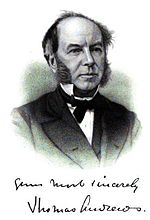Thomas Andrews (scientist)
| Thomas Andrews | |
|---|---|
 |
|
| Born | 19 December 1813 Belfast, Ireland |
| Died | 26 November 1885 (aged 71) Belfast, Ireland |
| Fields |
Chemistry Physics |
| Alma mater | University of Glasgow |
| Known for | Phase transitions |
| Notable awards | Royal Medal (1844) |
Thomas Andrews FRS FRSE (19 December 1813 – 26 November 1885) was a chemist and physicist who did important work on phase transitions between gases and liquids. He was a longtime professor of chemistry at Queen's University of Belfast.
Andrews was born in Belfast, Ireland, where his father was a linen merchant. He attended the Belfast Academy and the Royal Belfast Academical Institution, where at the latter of which he studied mathematics under James Thomson. In 1828 he went to the University of Glasgow to study chemistry under Professor Thomas Thomson, then studied at Trinity College, Dublin, where he gained distinction in classics as well as in science. Finally, at University of Edinburgh in 1835, he was awarded a doctorate in medicine.
Andrews began a successful medical practice in his native Belfast in 1835, also giving instruction in chemistry at the Academical Institution. In 1845 he was appointed vice-president of the newly established Queen's University of Belfast, and professor of chemistry there. He held these two offices until his retirement in 1879 at age 66. He died in 1885, and was buried in the Borough Cemetery in Belfast.
In 1842, Andrews married Jane Hardie Walker (1818–1899). They had six children, including the geologist Mary Andrews.
Andrews first became known as a scientific investigator with his work on the heat developed in chemical actions, for which the Royal Society awarded him a Royal Medal in 1844. Another important investigation, undertaken in collaboration with Peter Guthrie Tait, was devoted to ozone.
...
Wikipedia
